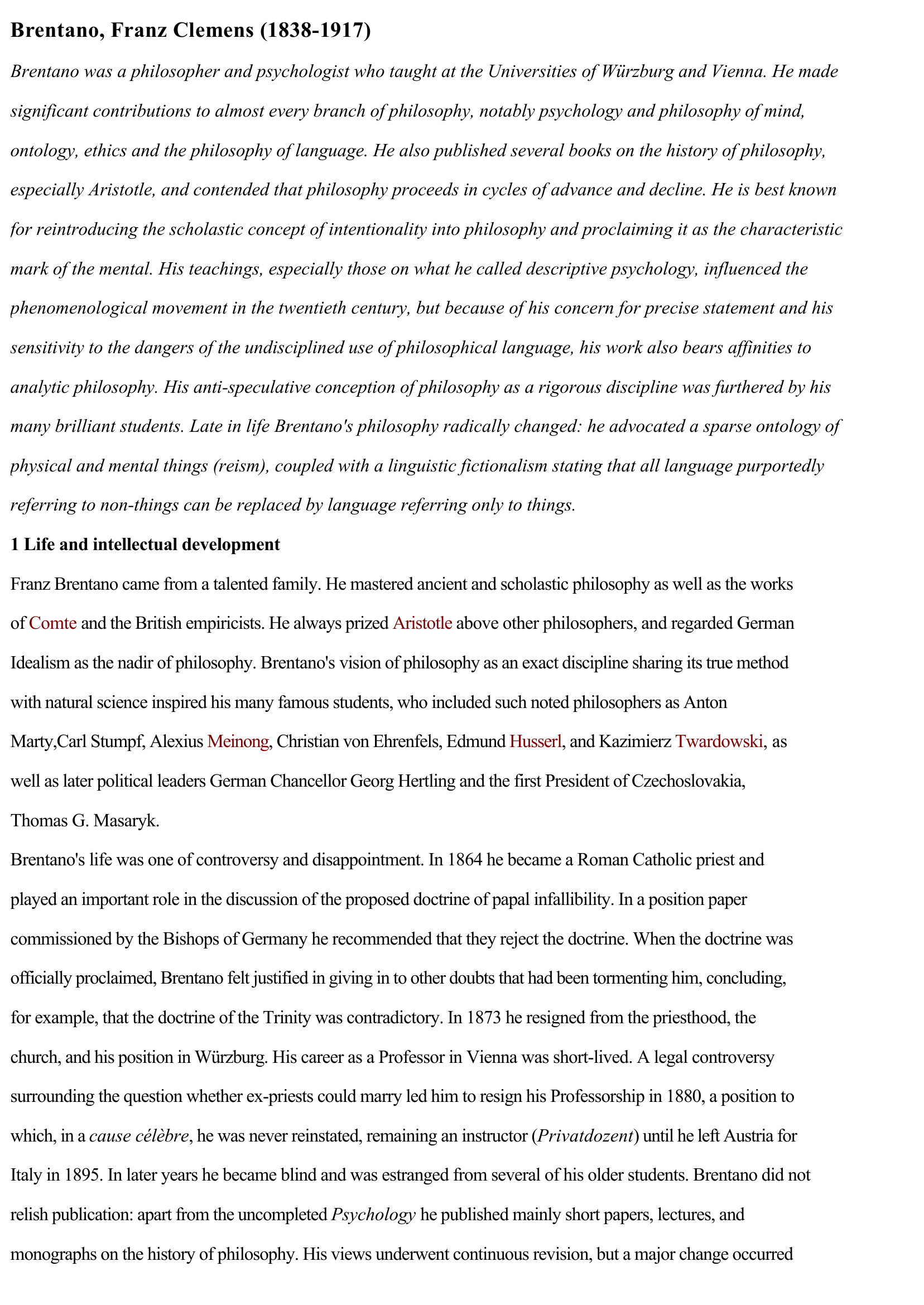Brentano, Franz Clemens
Extrait du document
«
Brentano, Franz Clemens (1838-1917)
Brentano was a philosopher and psychologist who taught at the Universities of Würzburg and Vienna.
He made
significant contributions to almost every branch of philosophy, notably psychology and philosophy of mind,
ontology, ethics and the philosophy of language.
He also published several books on the history of philosophy,
especially Aristotle, and contended that philosophy proceeds in cycles of advance and decline.
He is best known
for reintroducing the scholastic concept of intentionality into philosophy and proclaiming it as the characteristic
mark of the mental.
His teachings, especially those on what he called descriptive psychology, influenced the
phenomenological movement in the twentieth century, but because of his concern for precise statement and his
sensitivity to the dangers of the undisciplined use of philosophical language, his work also bears affinities to
analytic philosophy.
His anti-speculative conception of philosophy as a rigorous discipline was furthered by his
many brilliant students.
Late in life Brentano's philosophy radically changed: he advocated a sparse ontology of
physical and mental things (reism), coupled with a linguistic fictionalism stating that all language purportedly
referring to non-things can be replaced by language referring only to things.
1 Life and intellectual development
Franz Brentano came from a talented family.
He mastered ancient and scholastic philosophy as well as the works
of Comte and the British empiricists.
He always prized Aristotle above other philosophers, and regarded German
Idealism as the nadir of philosophy.
Brentano's vision of philosophy as an exact discipline sharing its true method
with natural science inspired his many famous students, who included such noted philosophers as Anton
Marty,Carl Stumpf, Alexius Meinong, Christian von Ehrenfels, Edmund Husserl, and Kazimierz Twardowski, as
well as later political leaders German Chancellor Georg Hertling and the first President of Czechoslovakia,
Thomas G.
Masaryk.
Brentano's life was one of controversy and disappointment.
In 1864 he became a Roman Catholic priest and
played an important role in the discussion of the proposed doctrine of papal infallibility.
In a position paper
commissioned by the Bishops of Germany he recommended that they reject the doctrine.
When the doctrine was
officially proclaimed, Brentano felt justified in giving in to other doubts that had been tormenting him, concluding,
for example, that the doctrine of the Trinity was contradictory.
In 1873 he resigned from the priesthood, the
church, and his position in Würzburg.
His career as a Professor in Vienna was short-lived.
A legal controversy
surrounding the question whether ex-priests could marry led him to resign his Professorship in 1880, a position to
which, in a cause célèbre, he was never reinstated, remaining an instructor (Privatdozent) until he left Austria for
Italy in 1895.
In later years he became blind and was estranged from several of his older students.
Brentano did not
relish publication: apart from the uncompleted Psychology he published mainly short papers, lectures, and
monographs on the history of philosophy.
His views underwent continuous revision, but a major change occurred.
»
↓↓↓ APERÇU DU DOCUMENT ↓↓↓

































